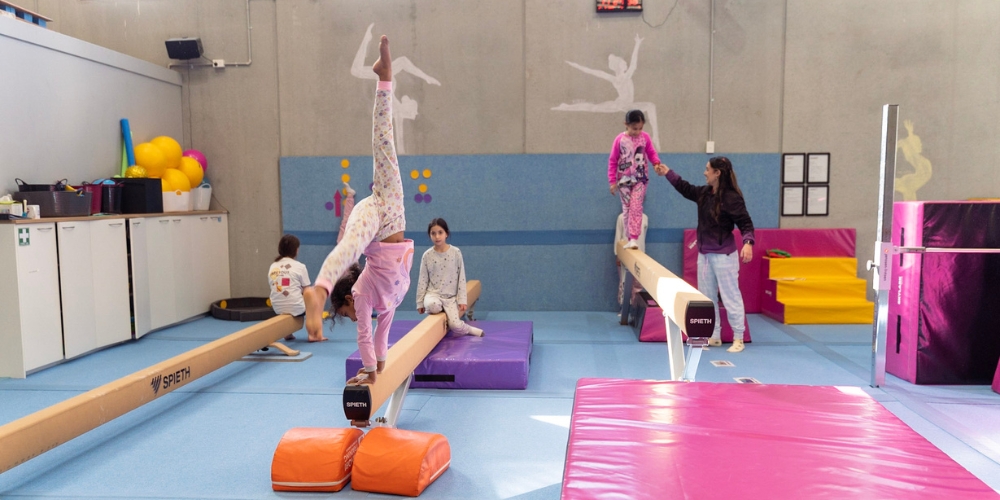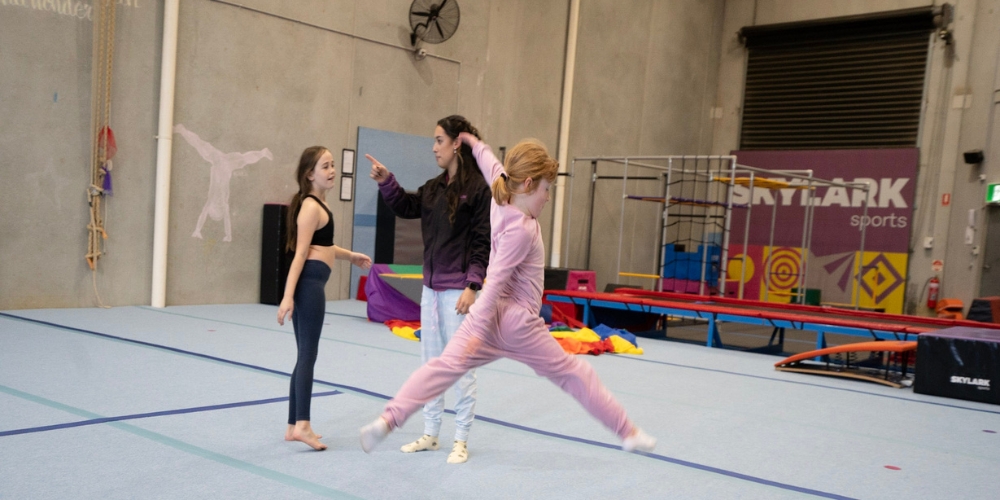I know you're quick to notice that gymnasts seem lacking in height, and if you ask a regular person if they have an idea why, they will be quick to answer that - oh, it's because of the sport.
To tell you frankly, gymnastic training doesn't stunt your child's growth, just as everyone else believes in.
Hold on, let's unpack that giant whooshing sound of everyone jumping to conclusions!
I've been coaching gymnasts of all ages for more than twenty years, and let me tell you, height has nothing to do with talent. Think about it: wouldn't the greatest gymnasts be towering giants if that were the case?
So, let's drop the myths and dive into the real story about height and gymnastics. Buckle up because the truth might even surprise you!

Why Are Gymnasts Short?
According to the Australian Bureau of Statistics (ABS), the average height for Australian men aged 18 and over is 178.6 cm (5 feet 10.5 inches). The average height for Australian women aged 18 and over is 166.2 cm (5 feet 5.4 inches).
The average height of a female gymnast is 4 feet 9 inches, while the average height of a male gymnast is 5 feet 4 inches. This is significantly shorter than the average height of the general population, which is 5 feet 4 inches for women and 5 feet 9 inches for men.
There are a few reasons why gymnasts tend to be shorter than average. One reason is that gymnastics is a weight-bearing sport, and shorter athletes have an advantage in this type of sport. This is because they have less weight, making it easier to perform acrobatic moves.
Another reason why gymnasts tend to be shorter is that they start training at a young age. When children start gymnastics at a young age, their bodies are still developing, and they are more likely to be shorter than their peers who do not start gymnastics until later in life.
Why do gymnasts appear to be shorter according to medicine?
According to a study published by the National Library of Medicine titled Role of Intensive Training in the Growth and Maturation of Artistic Gymnasts, despite ongoing debates about the impact of intensive training on the growth of young artistic gymnasts, a committee's literature review concluded that such training doesn't compromise adult height, affect body segment growth, or impact pubertal growth. While female gymnasts may be shorter for their age, this characteristic is likely a result of normal physical development rather than solely the consequence of training.
Myth Busting: Will Gymnastics Stunt Growth?
First, gymnastics will not stunt your child's growth when done right. It can be one of the most beneficial activities for their overall development. I've seen firsthand how gymnastics shapes strong, flexible bodies and builds resilient and confident individuals.
Breaking Down the Myth
The idea that gymnastics restricts development is frequently based on outdated beliefs. Growth is mostly influenced by genetics and diet, not by the beautiful twists and turns on the balance beam. The idea that a child's height is harmed by gymnastic instruction is unsupported by scientific research.
Understanding Growth Factors
Recognising that factors like genetics, hormones, and overall health play a more significant role in a child's growth than their involvement in gymnastics is crucial. As long as your child maintains a balanced lifestyle with proper nutrition, gymnastic training won't negatively impact their growth trajectory.

The Positives: Beyond the Mat
Let's now discuss the advantages. A wide variety of movements used in gymnastics support comprehensive growth. Gymnastic training is similar to a full-body workout that enhances your child's physical health by enhancing balance, coordination, and muscle strength.
Physical Benefits of Gymnastics
Gymnastics is a great way to improve strength, flexibility, and cardiovascular fitness. These physical characteristics support your child's general health and lay a strong foundation for a healthy lifestyle.
Building More Than Muscles
Furthermore, gymnastics' demands for focus and discipline might benefit a child's emotional and cognitive growth. Your child will gain life skills beyond the gymnasium, such as goal-setting, time management, and tenacity.
Life Skills Beyond Gymnastics
Gymnastics teaches virtues like perseverance, collaboration, and dedication. As a coach, I've seen young gymnasts develop their physical skills and resilience, an important quality in many facets of life.
Moderation Is Key
That being said, moderation is key. As a coach, I always stress the significance of leading a balanced lifestyle. Encouraging your child to engage in various activities can help them balance leisure, academics, and gymnastics. They must eat a healthy diet and get enough sleep to support their developing bodies.
Balancing Act
Although gymnastics is an excellent way to grow, finding a balance is important. Overcommitting to one activity, in particular, can cause burnout and harm a child's general well-being. It is imperative that you, as a parent and coach, support diversity in your child's interests and endeavours.
Frequently Asked Questions
Are there specific nutrition guidelines for young gymnasts?
There might be few rules, but ensuring your child eats a healthy, well-balanced diet that provides enough nutrients is still important. Speak with a nutritionist to customise food advice based on your child's exercise requirements and intensity.
At what age is it safe for my child to do flips and tumbles?
Children may safely learn gymnastics skills when taught and supervised by certified coaches. Enrolling your child in a reputable gymnastics programme with knowledgeable instructors who put safety first is imperative.
What can I do to help my child recover from rigorous training sessions?
It's crucial to heal and sleep well. Encourage your child to participate in relaxing activities, drink plenty of water, and get enough sleep.
Conclusion
Gymnastic training, far from hindering growth, can be a fantastic avenue for your child's physical, mental, and emotional well-being. So, if your little one dreams of somersaulting through the air or conquering the balance beam, let them spread their wings and fly – their growth won't be compromised, but their confidence and skills will soar to new heights.

